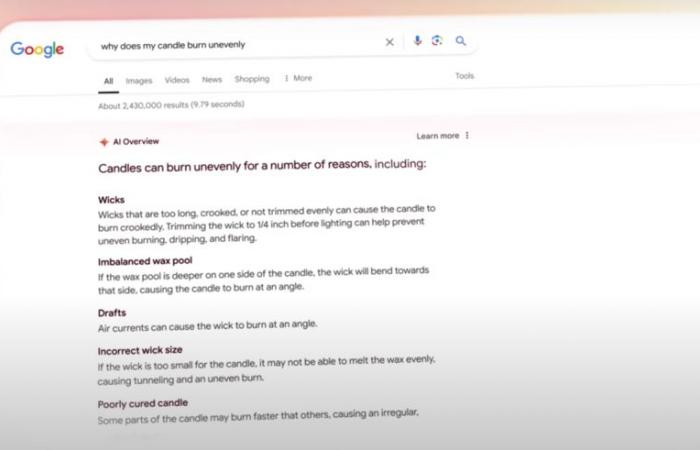This is Google’s first step in monetizing generative artificial intelligence on its search engine. Last week, the Mountain View giant began displaying ads in its new “AI Overviews” module, the content of which is produced by its large Gemini language model. For the moment, this only concerns the United States and only mobile media. But there is no doubt that these advertisements will gradually be launched everywhere else. The stakes are high for Google: if the deployment of AI is essential to adapt to new uses and to counter the arrival of new competitors, it also threatens to call into question its economic model. The engine must therefore prove its ability to generate at least as much revenue as with traditional searches.
Above links – Taken by surprise by the spectacular success of ChatGPT, Google quickly reacted, notably launching a rival chatbot – first called Bard, then renamed Gemini. However, it took its time to integrate this technology into its flagship product, unlike Microsoft with Bing, in particular because of its numerous factual errors. The “AI Overviews” module was launched in May, promising “completely redesigned search experience”. Since then, structured text, citing several sources, is displayed at the top of the results page for certain queries, above the traditional links and website extracts. This addition must respond to the start-up Perplexity AI but also to OpenAI, the designer of ChatGPT which has promised to launch new search functionalities.
Product carousel – To monetize artificial intelligence, Google has not opted for a revolutionary approach, like Perplexity, which is trying to impose the innovative format of sponsored questions. The group simply adopted the recipes already used on its search engine, which allow it to be the champion of online advertising. Concretely, a carousel of sponsored products (brands or distributors must pay to appear there) will be displayed before, after or within the response generated by Gemini, when an Internet user asks a question with a “angle commercial”, that is to say, which can result in a purchase in a few clicks. For example, Google will suggest stain removers if a user asks how to remove a grass stain from jeans.
Paid version? – For Google, the emergence of generative AI does not only threaten its market share in search, to the benefit of new players. It could also call into question its formidable cash machine, built on sponsored links, sold to advertisers to appear at the top when Internet users use certain keywords. However, these links are now relegated much lower, which should reduce the number of clicks. At the same time, AI will also result in higher costs. The inference of large language models is indeed more expensive than a simple search. This additional cost could amount to several billion dollars per year. Faced with these limits, the engine would study a change in its economic model, making certain functionalities chargeable.
To go further:
– Why Google’s AI feature increases errors
– With the help of Microsoft, OpenAI wants to compete with Google





